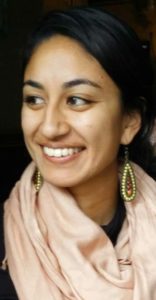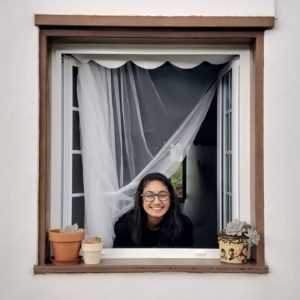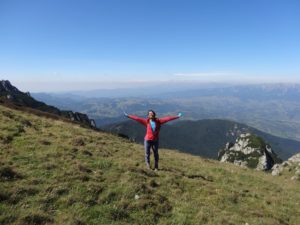 Our December 2019 Shero of the Month is Sonia Rastogi, who is from the Bay Area in California but currently living in Edinburgh, Scotland. Sonia, who is a member of PWN’s Board of Directors and was PWN’s first communications coordinator, is a gender-based violence and public health practitioner grounded in a social justice analysis. Currently, she works with women, girls, and communities affected by forced migration, armed conflict, and natural disasters. The PWN staff unanimously agreed that Sonia’s work in healing justice and her leadership of the safety and support team at the Organizing for Power Bootcamp in October was pivotal to the bootcamp’s success. “Sonia led the safety and support team with love, patience, and as much attention to the wellbeing of that team as to the rest of the participants they were going to be supporting through the inevitable challenging moments of tension, conflict, and external pain,” said Jennie Smith-Camejo, PWN’s communications director. “The result was not that no tough moments came up, but rather that the participants were able to get through them without those problems blowing up into crises for everyone around them. That’s not always easy to do, and we are so grateful to her leadership and compassion.”
Our December 2019 Shero of the Month is Sonia Rastogi, who is from the Bay Area in California but currently living in Edinburgh, Scotland. Sonia, who is a member of PWN’s Board of Directors and was PWN’s first communications coordinator, is a gender-based violence and public health practitioner grounded in a social justice analysis. Currently, she works with women, girls, and communities affected by forced migration, armed conflict, and natural disasters. The PWN staff unanimously agreed that Sonia’s work in healing justice and her leadership of the safety and support team at the Organizing for Power Bootcamp in October was pivotal to the bootcamp’s success. “Sonia led the safety and support team with love, patience, and as much attention to the wellbeing of that team as to the rest of the participants they were going to be supporting through the inevitable challenging moments of tension, conflict, and external pain,” said Jennie Smith-Camejo, PWN’s communications director. “The result was not that no tough moments came up, but rather that the participants were able to get through them without those problems blowing up into crises for everyone around them. That’s not always easy to do, and we are so grateful to her leadership and compassion.”
Sonia feels there are many reasons why healing justice in movement spaces has been slow to catch on in the fight for racial, gender, and reproductive justice. “One, we need to be real about the system that organizations and movements are operating in. Capitalism and neoliberalism are real. NGO-ization is real. The closing of space for funding and resourcing of movements and social justice work in a radical way is a reality. I am sure we all know of folks doing transformative work who have – by choice or by force – had to close their doors because they did not want to operate in such an environment.
“In some cases, how can we center healing when a space is perpetuating harm, abuse and white supremacy? Further, healing and negotiating trauma is difficult. It requires trust, and trust takes time. Healing unfolds in layers, and that unfolding takes time.”
Healing justice is a fairly new concept, introduced roughly 15 years ago by Cara Page and the Kindred Healing Justice Collective. As Sonia understands it, healing justice is “a recognition and exploration of past and present structural violence and intergenerational trauma. It is also a recognition of grief for anticipated future violence based on what is known or imagined in the present.”  Healing justice “can allow space to understand how white supremacy, colonialism, and capitalist systems show up in our daily lives, our interpersonal relationships and our communities. And also, healing justice is an active practice that assumes an anti-oppression framework. It puts at the center indigenous, Black, and people of color leadership and the rich histories of knowledge and practice around collective healing, reconciliation, and decision-making. A healing justice framework values trust and transparency to address trauma and root causes at individual and collective levels,” according to Sonia.
Healing justice “can allow space to understand how white supremacy, colonialism, and capitalist systems show up in our daily lives, our interpersonal relationships and our communities. And also, healing justice is an active practice that assumes an anti-oppression framework. It puts at the center indigenous, Black, and people of color leadership and the rich histories of knowledge and practice around collective healing, reconciliation, and decision-making. A healing justice framework values trust and transparency to address trauma and root causes at individual and collective levels,” according to Sonia.
Sonia has been learning about healing justice over the past couple of years. She said, “I came to learn about healing justice when thinking about trauma and its impact. When I was working at PWN, we were pushing –among many things!—for a recognition of the impact of violence on the lives of women living with HIV. We were talking about the intersectional injustices of structural violence showing up in communities of color, low-income communities, queer and trans communities, and so on. The presence of that violence is not a coincidence when you look at and understand U.S. and global history.
“I then started to think about trauma for communities living through armed conflict or authoritarian regimes, and how that plays out in the day-to-day. What does safety mean in terms of acute survival needs, but also safety at a deeper, more complex level? So, I stumbled upon the Healing Justice Podcast (shout out!) and started piecing together healing justice with some of the trauma-informed approaches that I was familiar with.” Advocates commonly come into movement spaces as a reaction to traumatic environments, conditions, or experiences. When working with these advocates, we should avoid inflicting any further harm on them. When asked how to make this common practice, Sonia said, “Movement spaces can support advocates by being trauma-informed through an anti-oppression lens. That means understanding what folks need in order to participate and lead; what folks need to be safe; identifying how to break cycles of oppression in movement spaces; reflecting on how trauma shows up in social justice work; taking the time to equip ourselves on how to move at the speed of trust and compassion; creating the physical and mental space to hold tensions and practice moving through conflict. Movement spaces can also know how to link folks to healers, organizations, networks, spaces, and practitioners who are practicing healing justice.
Advocates commonly come into movement spaces as a reaction to traumatic environments, conditions, or experiences. When working with these advocates, we should avoid inflicting any further harm on them. When asked how to make this common practice, Sonia said, “Movement spaces can support advocates by being trauma-informed through an anti-oppression lens. That means understanding what folks need in order to participate and lead; what folks need to be safe; identifying how to break cycles of oppression in movement spaces; reflecting on how trauma shows up in social justice work; taking the time to equip ourselves on how to move at the speed of trust and compassion; creating the physical and mental space to hold tensions and practice moving through conflict. Movement spaces can also know how to link folks to healers, organizations, networks, spaces, and practitioners who are practicing healing justice.
“I would like to appreciate the PWN staff for how we’ve prioritized healing justice, especially Venita for pushing forward healing justice and Barb for their initiative to center building safety at the bootcamp in Atlanta.
“Trauma is not a deficit. That statement is not meant to dismiss the injustices that led to trauma or the effect of trauma on people and communities. At the same time, it is to recognize that trauma, when given the space to heal, can allow us to rediscover who we are, to define our agency and to determine our choices. Healing is a journey that can allow us, our communities and our systems to be true and authentic.”


